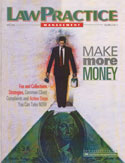Bill Gates and Bill Clinton share at least one thing in common: Lots of people appear to be out to get them. So here’s what’s new with Bill and Bill.
By Erik J. Heels
First published 4/2/1999; Law Practice Management magazine, “nothing.but.net” column; American Bar Association
 Microsoft The Defendant, Part 1
Microsoft The Defendant, Part 1
AOL bought Netscape. Microsoft has won the browser battle. The current antitrust suit is now irrelevant. If Microsoft is ordered to “unbundle” Internet Explorer from Windows, it just won’t matter. Because AOL is not interested in developing or selling Netscape, it is interested in selling products and services to the millions of users who call http://www.aol.com/ and http://www.netscape.com home. And that the $5.2 billion dollar sale of Netscape occurred validates Microsoft’s claims that competition in the browser market is alive and well. It also makes the government’s anticompetitive arguments more than a little bit tough to stick.
So it appears that Microsoft is winning – or has already won – this case.
Microsoft The Defendant, Part 2
Which brings us to case number 2. At least one small interesting Internet law suit is pending against Microsoft. But I’m guessing that with the AOL purchase of Netscape, Microsoft’s lawyers will have more spare time on their hands to dispense with these suits. In Hartford House, Ltd. v. Microsoft Corp., CV778550 (Santa Clara Supr. Ct. 12/21/98), the plaintiff alleges that several Microsoft e-mail programs (including Outlook, Internet Explorer, and WebTV) were treating its e-mail messages as “spam” and sending them to junk e-mail folders. Case arguments appear on both the plaintiff’s (http://www1.bluemountain.com/home/ImportantNotice.html?122198) and defendant’s Web sites (http://www.microsoft.com/presspass/bluemt/). In short, Microsoft uses a complicated algorithm to determine if e-mail is spam. For example, if the subject of the e-mail was “FREE FREE FREE $$$,” I’m guessing that Microsoft’s algorithm would determine that the message was spam. So the question is, does Microsoft have to change its algorithm? Or does Blue Mountain Arts have to change the format of its e-mail messages? Is this a case of unfair competition? Or of doctor-doctor-it-hurts-when-I-do-this (so-don’t-do-that)? I’m guessing that the court will rule the latter.
Microsoft the Great
I am in the process of switching to a nearly 100% Microsoft-powered desktop. I am not conceding defeat to Microsoft, as some may claim. I am simply switching to better software. I’m switching from Netscape Navigator to Microsoft Internet Explorer because I don’t believe that AOL will continue to develop Netscape software with the same zeal that Netscape did. Just like the sale of WordPerfect made Microsoft Word the number one word processing program, the sale of Netscape to AOL will make Internet Explorer the number one Web browser.
And I figured that as long as I was switching browsers, I might as well switch e-mail programs too and go 100% Microsoft. On January 1, 1999, I switched my e-mail program at work from Eudora to Microsoft Outlook. Eudora may still be the “better” e-mail program, but the writing is on the wall.
And while I’m on the topic, the new version of MicrosoftOffice for the Macintosh (Office98) is simply excellent. From the integrated help, to the built in templates and clipart, to the ease of creating HTML documents, Office98 Macintosh Edition is a well-oiled machine. I can’t imagine using anything else for word processing (Word), presentations (PowerPoint), and spreadsheets (Excel). FileMaker Pro, NetObjects Fusion, and Adobe Acrobat are the only non-Microsoft products that I use with regularity.
In addition to the powerful Word/PowerPoint/Excel combo, Office98 includes many useful “shared” applications including unified spelling and grammar checkers and MS Organizational Chart. Anyone that has tried to produce organizational charts manually will appreciate the ease of use of MS Organizational Chart.
Just like “buying IBM” was safe 20 years ago, buying Microsoft is safe today. Why? Because it continues to create excellent software that people want and need.
Clinton the Defendant
Like Bill Gates, Bill Clinton is also under attack. Arguments could also be made that both Bills are having a positive impact on the economy, but I suppose that depends on your perspective. Microsoft’s competitors’ and Republicans’ mileage may vary. Libertarians are no doubt rejoicing at the fact that with Congress focused on the House impeachment and Senate trial, Congress can’t enact more legislation like the Communications Decency Act. There’s nothing like a good bit of unconstitutional-on-its-face legislation to provide lots of fodder for columnists! OK, maybe it’s a good thing that Congress is wrapped up in the impeachment and post-impeachment process, but it’s forcing me to write about Lewinskygate.
So, against my better judgment, here’s my spin on the impeachment and post-impeachment process. I have four main observations about this whole issue.
First, there is an unprecedented amount of coverage available on the Web. Among the things available online are the House Judiciary Committee report (http://www.cnn.com/ALLPOLITICS/stories/1998/12/16/judicary.report/), video of President Clinton’s Grand Jury testimony (http://clintonvideo.broadcast.com/news/clintontestimony/real2.stm) and of the House of Representatives impeachment hearing (http://www.c-span.org/guide/executive/investigation/key1_documents.asp), live coverage of the proceedings (http://www.washingtonpost.com/wp-srv/politics/special/clinton/clinton.htm#live), and even the audio from Linda Tripp and Monica Lewinsky tapes (http://www.broadcast.com/news/tripptapes/archive.stm).
Second, there are lots of pro-Clinton and pro-removal sites. I hesitate to call the latter pro-impeachment sites, because the President has already been impeached, and he may end up being impeached but not removed from office. In other words, the general public isn’t really clear on the concept that “impeachment” is not the equivalent of “removal.” Then again, new reporters often state that defendants in criminal trials have plead “innocent,” when they mean, of course, “not guilty.” But I digress.
But none of these impeachment-related sites is very popular. The number of external sites that link to a particular site is a good measure of the site’s popularity. According to Alta Vista, nearly 10,000 sites (http://www.altavista.com/…) link to the ABA’s Web site. Here are the numbers for the impeachment-related sites:
Pro-Clinton
http://www.enoughisenough.org/ – 8 links
http://www.stonesthrow.org/ – 6 links
http://www.billclinton.net/ – 4 links
http://www.moveon.org/ – 0 links
http://www.nottheway.org/ – 0 links
Pro-Removal
http://www.impeachment.org/ – 240 links
http://www.clintonslastday.com/ – 35 link
http://www.resignation.com/ – 25 links
http://www.impeachclinton.org/ – 6 links
http://www.resign.net/ – 3 links
http://www.petitiondrive.com/ – 1 link
From these numbers I conclude that the general public doesn’t care about the impeachment and post-impeachment process. I think that the TV network executives would agree.
What does the public care about? The usual: sex (http://www.sex.com/ – 1245 links), drugs (http://www.starbucks.com/ – 253 links), and rock & roll (http://www.rock.com/ – 2118 links). It is a sign of the times that the Starbucks Coffee Web site has more links to it than the number one impeachment-related site.
Where does that leave me? Browsing the Internet with Microsoft Internet Explorer, e-mailing this column with Microsoft Outlook, and sitting here drinking my Starbucks coffee wondering how the two Bills’ troubles will affect the stock market. My prediction? Both Bills will survive their current legal problems, the stock market will continue to go up, and then we can get on with the business of worrying about Y2K (don’t even get me started!).


